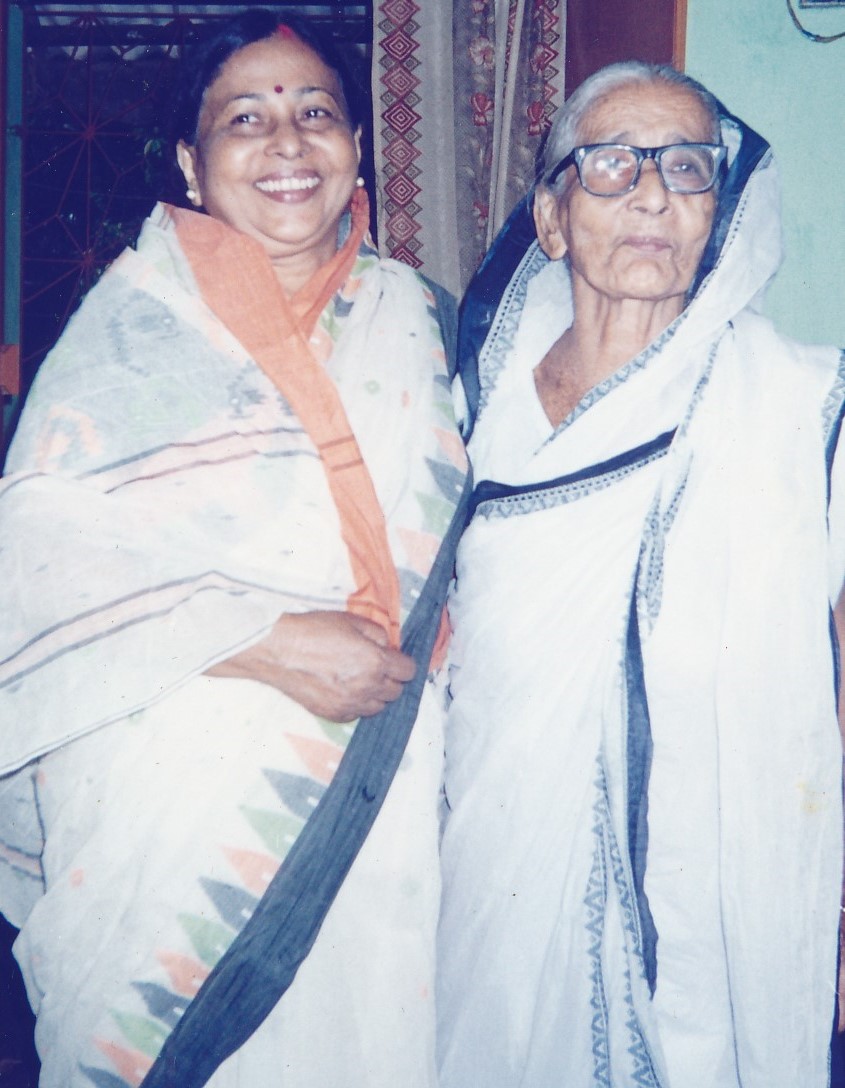This photograph, taken in October 2003, is one of my most precious possessions. On the right is Dida - feisty, resilient, impish; on the left, Ma - selfless, honest, hopelessly romantic.
Dida was a wild village girl, very much like Mrinmoyee in Tagore's story, 'Samapti' - given to romping around, climbing trees and playing pranks on others; and just like Amulya in the story, it was precisely this untamed nature of hers that attracted Dadu to her. He was the eldest son of a Zamindar in Jessore - so she had to naturally mend her ways and slip into the role of a 'boro-bou' (eldest daughter-in-law) after her marriage. It mostly meant, she'd told me once, having hardly anything to eat after serving meals to a huge household and mothering a string of little brothers' and sisters'-in-law, the last of whom (the 19th child) was only a few years older than her first-born. She was 14 then. By then, she was already a veteran householder, and the next decade and a half passed by bearing 7 children in quick succession. But her world fell apart when she was suddenly widowed at 28, with her children then aged between 2 and 14. With no formal education of her own and cheated out of her husband's inheritance, she brought up her children - who had to adjust from a life of plenty to that of poverty - with an indomitable will and a fierce pride that left no room for others' pity.
Ma - the eldest daughter - was the man of the house from a very tender age, earning herself an education on the strength of scholarships right from school to university and becoming a lecturer of Bengali Literature soon after. Along with her elder brother (with whom she shared a special bond, which was very Nita-Shankar at its core), her maiden life was devoted to standing by her mother, looking after the well-being of her younger siblings, and turning the fortunes of her family from utter destitution to one of lower middle-class gentility. Things didn't change much after her marriage either - as her marital life was completely given over to the new family she created, to supporting her husband's multiple idealistic obsessions and to her two daughters whom she chose to bring up giving up her career.
Ma and Dida were both creative souls. Dida's creativity took myriad forms: in addition to what grannies of our generation habitually did, like making pickles and sweets ('aachar', 'aamshotto', 'narkel nadu'), she loved gardening. Her home was surrounded by mango and jackfruit trees, and she grew chillies, brinjal and tomato in her own small patchwork garden, tending to them with loving care. Above all, she was a great 'kantha' artist. She wove dozens of them for her ever increasing family - her 7 children and their spouses, 14 grandchildren and their spouses, great grandchildren (she lived to see 4 of them); her extended relations and their brood.
She also made two in advance for my child-to-be, whom she was desperate to see but who came into the world two years after she was gone. My daughter, Srishti, now uses the gift that Dida had left her. Every time I tuck her in, in her kantha, I remember Dida, and marvel at the fact that she is wrapped in the warmth of the love of a great grandmother she has never seen.
There was another unique side to Dida: she wrote poetry. It was somewhat raw but touching, the most memorable ones being those she wrote after she lost her only grandson - a sprightly creature of 4, the darling of the family, who died of a sudden heart attack. Dida never lived that loss down.
Ma was immensely talented: a trained Rabindra sangeet singer, an untrained elocutionist, and a closet writer. Poetry was her first love: she read poetry and wrote her own incessantly. But she also wrote fiction, which she never bothered to publish. Her only published work (apart from a book of rhymes for children), a collection of short shorts, came out in 2014, just two years before she passed away. Initially inspired by Banaphool's 'Natun Golpo' and written over a period of time, it is an accomplished work. Unfortunately, it has been able to reach only a limited audience.
Ma's creativity manifested itself in something else, too - her 'sansar'. Domesticity and its inevitable drudgery never bogged her down. Though it took her away from leading a fuller intellectual life which her teaching career would have given her, she nevertheless turned homemaking into an everyday art that she practiced with thrift and ingenuity till her last years.
Though they had obviously different life trajectories, Ma and Dida were bound intimately by the pain of a primal loss - the sudden shocking death of Dadu when he was only 42. He was a rare man for his times: a husband who had given both love and respect to a semi-literate wife 14 years his junior; and a father who, instead of being a stern disciplinarian, doted on his children, none more than his eldest daughter. Ma was only 7 when she lost him, but she mourned him all her life. And her life would undoubtedly have been far less thorny had he been around. For Dida, the memory of her husband's love was the only weapon in her widowed armour - that gave her the strength not only to fend off unwarranted male advances, but more importantly to cope with insurmountable odds. Pain and loss need to be endured. And they did. But they always wore the badge of endurance with dignity, continually found joy in the little things of life, and sustained themselves with writing.
This is my matrilineal inheritance. I'd like to bequeath it to Srishti - hopefully, with a greater quotient of happiness and freedom.


